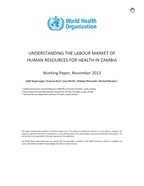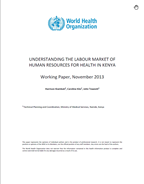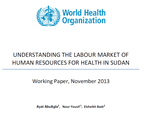People
Health labour market and partnerships
Analysing the health labour market is essential to achieve a better understanding of the forces that drive health worker shortages and surpluses, skills mix and geographical imbalances and suboptimal performance, and to develop effective policies to address these issues.
To that end, the Health Labour Market team develops guidance and technical products related to health labour market analysis and is conducting health labour market analyses in countries together with colleagues from WHO regions and WHO country offices.
A well conducted health labour market analysis is critical to providing reliable information on the main dimensions of the health workforce, notably in terms of availability, accessibility, acceptability and quality. Health labour market analysis is not an end on its own but a crucial element in health workforce policy development and is instrumental in answering important policy questions related to health workforce.
Publications
Health labour market analysis guidebook
The health labour market analysis guidebook provides a comprehensive overview of the health labour market, offers guidance on how to analyse and understand...
With nearly half of the world’s population living in a rural or remote area, meeting the health needs of rural populations, where over 80% of the...
The evidence-based recommendations relate to the movements of health workers within the boundaries of a country and focus on strategies to increase...
Securing equitable access to health services for rural and remote populations continues to be a challenge for governments and policymakers around the...
The World Health Organization’s (WHO) 2010 Increasing access to health workers in remote and rural areas through improved retention: global policy...
Delivered by women, led by men: A gender and equity analysis of the global health and social workforce...
The report, produced by the WHO Global Health Workforce Network’s Gender Equity Hub, co chaired by WHO, and Women in Global Health, is the latest...
Technical documents

Universal health coverage depends on having the necessary human resources to deliver health care services. Zambia is among the African countries currently...

Universal health coverage depends on having the necessary human resources to deliver health care services. Kenya is among the African countries currently...

Universal health coverage depends on having the necessary human resources to deliver health care services. Sudan is among the African countries currently...
External publications
The Road to Universal Health Coverage
The importance of strengthening the health workforce in Nigeria to improve health outcomes
Rethinking Human Resources for health - On the edge of the Post-Modern Era
Related teams
Multimedia
Tools
Our work in countries
Resolution WHA69.19 on the Global Strategy on Human Resources for Health: Workforce 2030, adopted by the 69th World Health Assembly in May 2016 includes three key actions related to assessing the health workforce implications of health policy and programmes:
- Development partners, including bilateral partners and multilateral aid mechanisms, will augment, coordinate and align their investments in education, employment, health, gender and labour in support of domestic financing aimed at addressing national health workforce priorities
- Global health initiatives will ensure that all grants include an assessment of health workforce implications, leverage national coordination and leadership, and contribute to efficient investment in and effective implementation of national health workforce policies
- An assessment of the health workforce implications will be made for technical resolutions brought before the World Health Assembly and WHO regional committees.
This section presents health workforce impact assessments for technical documents that have been submitted for discussion by the Executive Board and World Health Assembly.
72nd World Health Assembly
Roadmap on access to medicines, vaccines and health products 2019–2023
72nd World Health Assembly, May 2019
